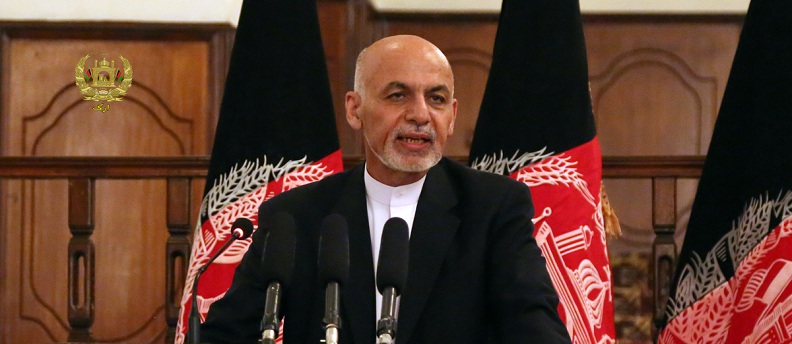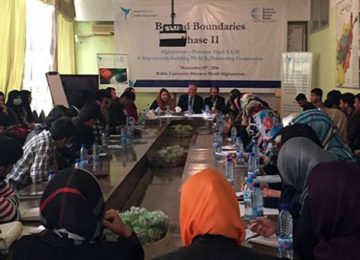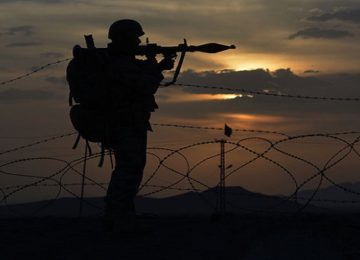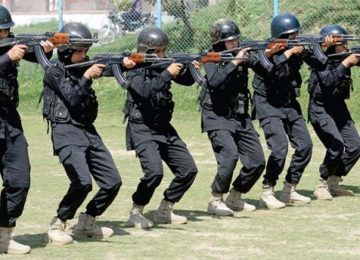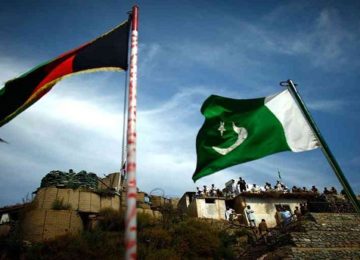Afghan President Ashraf Ghani has reportedly accepted the invitation extended to him by General Qamar Bajwa to visit Pakistan. “President Ghani indeed accepted the invitation after it was extended to him by Gen Bajwa on behalf of the Government of Pakistan,” Afghan Ambassador Dr. Omar Zakhilwal stated on Thursday. Dr. Zakhilwal was part of President Ghani’s high-level delegation in talks with the Pakistan’s army chief. When inquired about the timing of the president’s visit, Dr. Zakhilwal said “no timing of the visit has been finalized so far.”
While speaking at an anti-corruption conference in Kabul on Thursday, the Afghan leader reiterated the need for increased dialogue with Pakistan to secure peace and stability. “We must secure peace. I call, once again, on Pakistan to intensify the state-to-state dialogue with us to secure regional peace and security,” he is reported to have said in comments posted by the presidential palace on its official Twitter account.
Following General Bajwa’s visit to Kabul last week, there have been mixed messages coming from Afghanistan seeing the two countries have been at the lowest ebb amid deep mistrust in their relations. General Bajwa renewed Pakistan’s long standing offer of imparting training to the Afghan security personnel, an offer Kabul seems to have declined. Afghan Defense Ministry’s Spokesman Dawlat Waziri told reporters in Kabul after the visit of the Pakistan army chief that Afghanistan will not send army officers for training in Pakistan keeping in view what he called the ‘mutual mistrust’. “Pakistan should deal with us as a sovereign state. Pakistan should not consider us its 5th province. There is no chance to send our army cadets to Pakistan unless the environment of trust is developed. If this happens there will be no hurdle to send our army men for training to Pakistan as we are sending them to India, Russia, China, Tajikistan, Uzbekistan and other countries,” Waziri has been recorded as saying at a news conference in Kabul this week.
Previously in February 2015, Afghanistan had sent six Afghan National Army cadets to receive training at the Pakistan Military Academy (PMA) in Abbottabad when relations between the two neighbors were on a smooth track and President Ashraf Ghani also showed a goodwill gesture to Pakistan’s request. Ghani’s predecessor Hamid Karzai, the longest elected Afghan leader, however, had also turned down Pakistan’s offer to train army cadets. In spite of their tense relations, the recent acceptance of Pakistan’s invitation by President Ghani is being seen a major development as it will be a continuation of the high-level contacts and will enable leaders to address each other’s concerns directly.
The tense relationship between the two neighbors had also affected the frequency of their bilateral visits and high-level talks, particularly since Afghanistan lowered the level of its participation in the Economic Cooperation Organization (ECO) summit in Islamabad in March this year. The summit was attended by six presidents, one prime minister and two deputy prime ministers, but Afghanistan had only been represented by its ambassador in Islamabad.
Earlier in November last year, Afghanistan also joined India to boycott the SAARC Summit scheduled to be held in Islamabad which resulted in its postponement. The 19th SAARC Summit has still not been held.
On the other hand, despite opposition by certain quarters, Pakistan participated in the 6th Ministerial Conference of the Heart of Asia – Istanbul Process – in the Indian city of Amritsar in December last year where President Ghani refused to accept Pakistan’s offer of 500 million dollar in aid.
Pakistan’s persistent invitations to Afghan leaders, including Afghan Chief Executive Dr. Abdullah Abdullah, have been pending since long. Ousted Prime Minister Nawaz Sharif had also extended an invitation to Dr. Abdullah last year which he reiterated this year as well. Previously, Nawaz Sharif invited former Afghan President Hamid Karzai twice who had told a Pakistani media delegation in May that he would visit Pakistan after Eid-ul-Fitr. However, his plan never materialized, apparently due to continuing tensions in the two countries’ relations.
The Afghan parliamentary delegation also postponed its visit to Pakistan twice. The delegation was scheduled to visit first in August and then in September this year but was postponed. While, in April this year Pakistan sent a 15-member parliamentary delegation headed by National Assembly Speaker Sardar Ayaz Sadiq to Afghanistan. President Ashraf Ghani’s acceptance of the offer to visit Pakistan is certainly a positive change in behavior on part of the Afghan government.
The writer Tahir Khan is an advisor to CRSS-ASC, and a member of Pak-Afghan Track 1.5/11 Beyond Boundaries’ Pakistan group.
© Center for Research and Security Studies (CRSS) and Afghan Studies Center (ASC), Islamabad.



